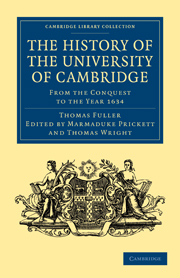Book contents
- Frontmatter
- THE EDITOR'S PREFACE
- HISTORY OF THE UNIVERSITY OF CAMBRIDGE SINCE THE CONQUEST
- Dedication
- PREFACE
- REVERENDISSIMO ANTISTITI, JACOBO USSERIO, ARCHIEPISCOPO ARMACHANO, Domino suo colendissimo
- SECTION II
- DOMINO GULIELMO PASTON, DE PASTON IN COM. NORF. EQUITI AURATO, Patrono meo colendissimo
- SECTION III
- ROULANDO LITTON, In pago Hertfordensi Armigero
- SECTION IV
- RADULPHO FREEMAN, In Comitatu Hertfordensi Armigero
- SECTION V
- EDV. BENLOSSIO, Armigero, Mecænati suo benevolo
- SECTION VI
- EDVARDO PALMER, DE WALTHAM ARMIGERO
- SECTION VII
- TO FRANCIS ASH, Of London, Esquire
- SECTION VII
- THOMÆ PLAYER Armigero, Camerarii Londinensis primogenito
- SECTION VIII
- A PRAYER
- INDEX
SECTION VI
Published online by Cambridge University Press: 05 March 2012
- Frontmatter
- THE EDITOR'S PREFACE
- HISTORY OF THE UNIVERSITY OF CAMBRIDGE SINCE THE CONQUEST
- Dedication
- PREFACE
- REVERENDISSIMO ANTISTITI, JACOBO USSERIO, ARCHIEPISCOPO ARMACHANO, Domino suo colendissimo
- SECTION II
- DOMINO GULIELMO PASTON, DE PASTON IN COM. NORF. EQUITI AURATO, Patrono meo colendissimo
- SECTION III
- ROULANDO LITTON, In pago Hertfordensi Armigero
- SECTION IV
- RADULPHO FREEMAN, In Comitatu Hertfordensi Armigero
- SECTION V
- EDV. BENLOSSIO, Armigero, Mecænati suo benevolo
- SECTION VI
- EDVARDO PALMER, DE WALTHAM ARMIGERO
- SECTION VII
- TO FRANCIS ASH, Of London, Esquire
- SECTION VII
- THOMÆ PLAYER Armigero, Camerarii Londinensis primogenito
- SECTION VIII
- A PRAYER
- INDEX
Summary
King Henry comes to Cambridge
A. D. 1505. 21 Hen. VII.
Henry the Seventh came to Cambridge, where he bestowed an hundred marks on the University, and forty pounds (a fair sum in that age from so thrifty a king) on the fabric of St. Mary's, where the scholars meet weekly at public sermons, and yearly at the commencement.
The building of St. Mary's.
2. The mention of St. Mary's mindeth me of churchwork indeed, so long it was from the founding, to the finishing thereof; as,
Begun May 16, 1478, when the first stone thereof was laid in the 17th of Edward the Fourth.
The church ended (but without a tower or belfry) 1519, in the 11th of Henry the Eighth.
The tower finished 1608, in the 6th of King James.
Caius Hist. Acad. Cantab. lib. i. p. 90.
So that from the beginning, to the ending thereof, were no fewer than an hundred and thirty years. There was expended in the structure of the church alone, seven hundred, ninety five pounds, two shillings and a penny; all bestowed by charitable people, for that purpose. Amongst whom, Thomas Barrow, Dr. of Civil Law, Archdeacon of Colchester, formerly Fellow of King's Hall, and Chancellor of his house to King Richard the Third, gave for his part, two hundred and forty pounds.
The foundation of Christ's College.
3. One may probably conjecture, that a main motive, which drew King Henry this year to Cambridge, was with his presence to grace his mother's foundation of Christ's College, now newly laid, without Barnwell gate, over against St. Andrew's Church, in a place where God's House formerly stood, founded by King Henry the Sixth.
- Type
- Chapter
- Information
- The History of the University of CambridgeFrom the Conquest to the Year 1634, pp. 180 - 225Publisher: Cambridge University PressPrint publication year: 2009First published in: 1840



